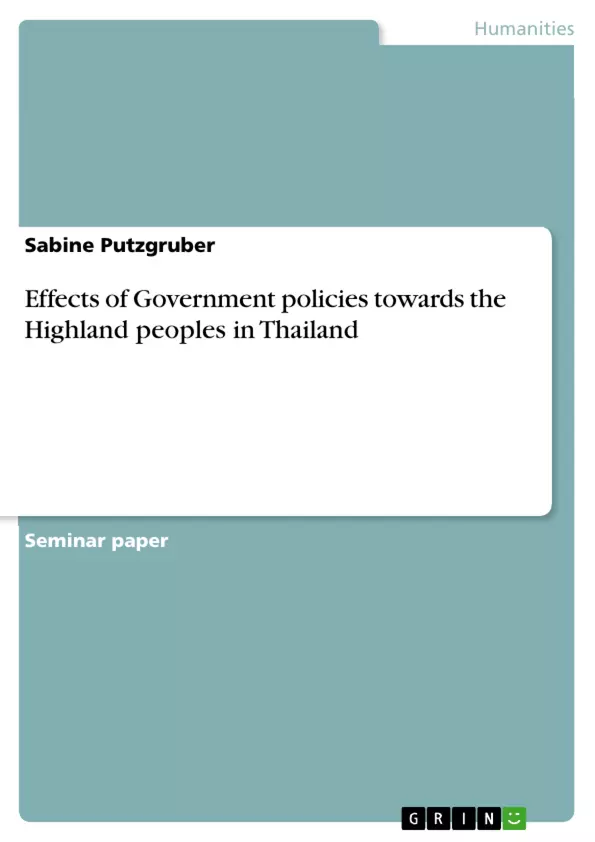This following paper is dedicated to the Highland Peoples of Thailand, which are written about and “developed” by the Thailand government and others but seldom have the chance to speak or write back. Seemingly their traditional way of living is not fitting into the modern capitalist and globalized world any more, which is surrounding them and new challenges are coming up each day. Individuals and groups have to adjust in some way to the world as it is now only changing but also getting smaller. As they are living within the nation state of Thailand there is not much option for them as to accept the western nationalism concept and the Thais as the dominant group in the state. The way they deal with this situation and the way the Thai government is dealing with it and is trying to improve the situation not leading to problems derived from ethnic differences should be the reason for this paper. The Thai concern for their national identity is valid, given the diversity of minority groups within their border and the rise of ethno political conflicts throughout the world (Kampe 1997:24). As ethno political problems are everywhere in heterogeneous societies a comparative approach has to be taken. Nonetheless will the focus be on the living of Highland Peoples within Thailand and changes which occurred to their communities from the outside over the last decades. We will look into the lives of the six recognized “Hilltribes” in Thailand and their situation as residents of the state of Thailand. A big issue should be the cultural clash between different cultural heritages and the Thai government actions trying to cope with it. At the end we will think about ways and policies which have been done and policies which in our view should be done. Suggestions would only concern the particular issue of the Highland Peoples living in Thailand and are opted for the best outcome for the those peoples written about, including the Thais. The author is aware of that the outcome is only suggestions and does in no case challenge the autonomy of the peoples involved.
Inhaltsverzeichnis (Table of Contents)
- INTRODUCTION
- STEREOTYPES
- HIGHLAND PEOPLES OF THAILAND
- THE KAREN
- HMONG
- MIEN
- LAHU
- LISU
- AKHA
- SOME? CHANGES
- ECONOMIC SITUATION
- ENVIRONMENT
- GOVERNMENT ACTION
- BENEFITS
- CULTURE
- CONCLUSIONS
Zielsetzung und Themenschwerpunkte (Objectives and Key Themes)
This paper examines the situation of Highland Peoples in Thailand, focusing on the impact of government policies on their lives and the challenges they face in a rapidly changing world. The goal is to provide a comprehensive overview of their situation, analyze the cultural clash between their traditional practices and the dominant Thai culture, and suggest potential policies that could better address their needs.
- The impact of government policies on Highland Peoples' lives
- Cultural clash between Highland Peoples' traditions and Thai culture
- Challenges faced by Highland Peoples in a globalized world
- The role of stereotypes in shaping perceptions of Highland Peoples
- Potential policies to address the needs of Highland Peoples
Zusammenfassung der Kapitel (Chapter Summaries)
The first chapter introduces the topic of Highland Peoples in Thailand and outlines the paper's objectives. It emphasizes the importance of understanding their perspective and the challenges they face in adapting to modern society.
The second chapter delves into the stereotypes surrounding Highland Peoples, highlighting the negative perceptions that often accompany their traditional practices. The chapter explores how these stereotypes perpetuate a sense of second-class citizenship and hinder progress.
Chapter three provides a detailed overview of the six recognized Highland Peoples in Thailand, including the Karen, Hmong, Mien, Lahu, Lisu, and Akha. It discusses their origin, traditional practices, and the unique challenges they face within the Thai state.
The fourth chapter examines the economic situation of Highland Peoples, focusing on the shift from opium cultivation to alternative cash crops. It analyzes the impact of government policies on their livelihoods and explores the challenges associated with economic integration.
Schlüsselwörter (Keywords)
The key themes of this paper are Highland Peoples, Thailand, cultural clash, government policies, stereotypes, economic situation, environmental impact, and national identity. The work focuses on the challenges faced by Highland Peoples in adapting to a changing world, analyzing the impact of government policies and the need for a more inclusive approach to their needs.
Frequently Asked Questions
Who are the six recognized "Hilltribes" in Thailand?
The six recognized groups are the Karen, Hmong, Mien, Lahu, Lisu, and Akha.
What is the main cause of cultural clash for Highland Peoples?
The clash stems from the conflict between traditional ways of living and the modern, capitalist, and nationalistic concepts of the dominant Thai state.
How has the economic situation of Highland Peoples changed?
There has been a significant shift from traditional opium cultivation to alternative cash crops promoted by the government.
What role do stereotypes play in the lives of Highland Peoples?
Stereotypes often paint these groups in a negative light, hindering their integration and leading to a sense of second-class citizenship.
What is the focus of Thai government policies towards these groups?
The government aims to integrate them into the national identity while managing ethnic differences and environmental concerns related to highland farming.
- Citation du texte
- Sabine Putzgruber (Auteur), 2004, Effects of Government policies towards the Highland peoples in Thailand, Munich, GRIN Verlag, https://www.grin.com/document/56020



